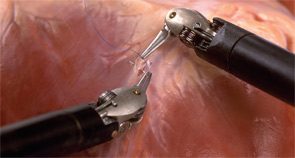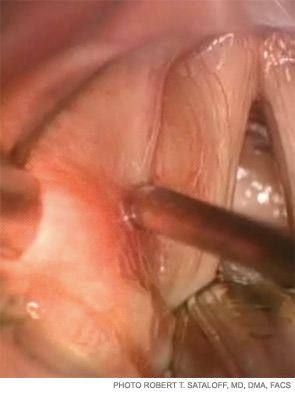What is the efficacy of combined positron emission tomography-computed tomography (PET-CT) in identifying salivary gland malignancies, and what is its role in the management of these patients? Background: In early studies, […]
Fibula and Osteocutaneous Radial Forearm Free Flap Are Comparable
Does the osteocutaneous radial forearm free flap (OCRFFF) provide equivalent functional outcomes and improved morbidity compared to the fibular free flap (FFF) in mandibular reconstruction? Background: Although widely used due to […]
Treating Allergic Rhinitis: A Patient Experiment
Berrylin J. Ferguson, MD, FACS, FAAOA, associate professor of otolaryngology and director of the Division of Sino-Nasal Disorders and Allergy at the University of Pittsburgh School of Medicine in Pittsburgh, Pa., uses the following form to help determine which allergy treatments will work best for each patient.

Mission Possible: Humanitarian work allows otolaryngologists to enact change
Performing international surgical outreach missions to help the world’s most disadvantaged patients overcome the disability imposed by disease is an extremely rewarding experience. Missions are challenging, varying in their length, level of working and living conditions and the surgery performed. Despite the rigors of mission work, there has not been a mission where members of the medical team did not find the experience to be life changing.

Alternative Remedies for Chronic Rhinosinusitis: Are complementary and alternative treatments harmful or advisable?
Laurie McCombs, 53, has dealt with sinus problems nearly all of her adult life. Clogged sino-nasal passages made it difficult for her to breathe at night, and the congestion caused morning pressure headaches. Over-the-counter and prescription antihistamines muted her symptoms but did not address their cause. At the age of 40, she decided to take the advice of friends who had experienced relief with acupuncture. Now McCombs follows the advice of the acupuncturist, who diagnosed her with allergies to dairy products and yeast, by limiting her intake of breads and milk products. She also continues to take loratadine and has found saline irrigation with the neti pot helpful in clearing her sinuses.
Avoid the Hot Seat: How to prepare for a CMS audit
In February, the Centers for Medicare and Medicaid Services (CMS) began rolling out its national Recovery Audit Contractor (RAC) program, aimed at ferreting out improper payments and preventing fraud, waste and abuse in the Medicare system. If you bill for Medicare fee-for-service, you are fair game for a RAC audit. A three-year demonstration of the RAC program, which ended in March 2008, heavily targeted bronchoscopy, injectable drugs and IV hydration therapy. But auditors are rapidly expanding the list, and the permanent program will include adenoidectomies, tonsillectomies, thyroidectomies and other otolaryngology-related procedures.

Show Me the Evidence: Comparative effectiveness research could aid treatment decisions
A push at the national level to fund more comparative effectiveness research could mean more information for otolaryngologists about which treatments work best for a given condition and in which patients.

Scarless Surgery: The benefits and drawbacks of robotic thryroidectomy
Using robotic arms, surgeons can now remove the thyroid gland through an incision in the axilla, or armpit, thereby avoiding the large scar on the front of the neck caused by traditional thyroid surgery. The procedure offers no other benefits over the traditional approach developed a century ago by Emil Theodor Kocher, MD, according to head and neck surgeons who perform the robotic surgery. In fact, it takes longer to recover from the robotic surgery, they say, with some patients complaining of chest numbness for months afterwards.

The Voice Lift: Should vocal fold surgery be considered a cosmetic procedure?
People get face-lifts and other types of cosmetic surgery to look better. They exercise so that they’ll feel better. But few people consider a voice lift, which combines surgery and exercise to make them sound better.

A New Game Plan: Otolaryngologists and consultants devise solutions to ride out the recession
Otolaryngologists understand that even their most loyal patients, with finances ravaged by the lingering economic recession, may postpone or forego endoscopic sinus surgery, tonsillectomy or a chemical facial peel in favor of paying the mortgage.
- « Previous Page
- 1
- …
- 293
- 294
- 295
- 296
- 297
- …
- 342
- Next Page »